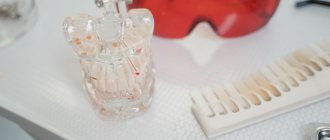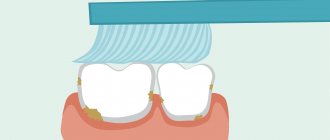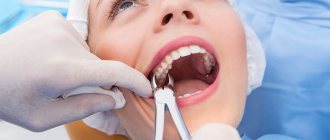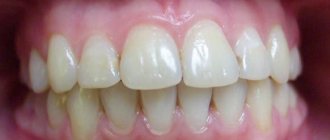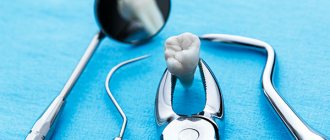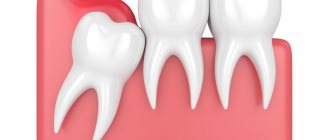At the Line of Smile dental clinic there is no clear policy not to operate on “these days.” But we always try to take into account the cyclical nature of women’s physiology, since surgery during menstruation can negatively affect further wound healing. Therefore, it is important for the client to be honest during the consultation with the doctor and not be embarrassed to ask to reschedule the planned operation. However, if an x-ray shows that there is an infectious focus, removal is carried out on an emergency basis, regardless of what day of the menstrual cycle we are talking about.
Why is it undesirable to have surgery during menstruation?
When planning an extraction, a highly qualified dentist always finds out what stage the woman is in her menstrual cycle. Why is he asking this? It's simple. The quality and composition of the blood directly determines the effectiveness of the anesthesia used and the rate of formation of a blood clot in the socket.
On menstrual days, blood clotting is significantly reduced. That's how it should be. Its composition also changes. Therefore, whenever possible, planned surgical intervention is postponed to “safer” days of the cycle.
Contraindications to the procedure
For some symptoms during the menstrual period, extraction is not done:
- severe abdominal pain, due to which you have to take painkillers;
- nausea;
- low blood pressure;
- heavy periods (heavy bleeding);
- dizziness.
If you feel unwell, surgical intervention will only worsen the problem. The likelihood of complications also increases, and pain after the anesthetic wears off can be excruciating.
Dental diagnoses in which periods are not a hindrance
If you doubt whether it is possible to remove a tooth during menstruation, contact your dentist. If the doctor deems it necessary, he will postpone the operation until later.
Indications for emergency intervention are:
- Severe inflammation, a purulent process that can provoke the development of an abscess, phlegmon, infection of the maxillary sinuses, osteomyelitis.
- A retracted (not fully erupted) wisdom tooth that is completely or partially hidden under the gum tissue/bone. It should be removed as soon as possible if a woman suffers from severe pain, swelling and swelling of the cheek.
- A tooth root fracture resulting from an injury.
- An advanced form of periodontal disease, when it is no longer possible to save the unit.
The specialists at the Line of Smile dental clinic never prescribe removal if it is possible to do without it. They always try to save the diseased tooth and prevent its further loosening and loss. If the roots are in good condition, a pin is installed in them, onto which the crown is fixed on top. Surgery is a last resort.
The need for a removal procedure
In some situations, delaying tooth extraction is not advisable and even dangerous. Severe inflammation increases the likelihood of developing sinusitis, otitis, osteomyelitis, sepsis and other dangerous diseases.
Indications for removal on critical days:
- acute pain that is poorly relieved by medication;
- severe swelling, swelling of the cheek;
- purulent inflammation: periodontitis, cyst and other pathologies;
- toothache accompanied by fever;
- acute pulpitis;
- tooth root fracture;
- impacted “figure eight”, which causes severe pain and swelling.
Menstruation does not become an obstacle if a woman is planning a business trip or vacation in the coming days. It is better to solve the problem in advance than to suffer from pain, postponing treatment until you return.
When to delay deletion
Any planned surgical intervention can be postponed for a couple of days until the menstrual bleeding stops.
So, you can wait if you need to delete:
- dystopic tooth located out of place;
- units that impede the implementation of prosthetics and the installation of orthodontic structures;
- wisdom teeth, which constantly injure the gums and mucous membranes of the oral cavity, cause chronic injuries and inflammation.
Chronic diseases often worsen on the eve of menstruation. This is due to a decrease in immune defense. If a woman knows that after menstruation she needs to go to the dentist and have a tooth removed, she should be especially careful about her health so as not to catch a cold. Otherwise, the procedure will have to be postponed indefinitely.
In what cases is it better to postpone extraction?
Tooth extraction is a last resort when therapeutic treatment is impossible or does not bring a positive effect. If there is no serious inflammation, then the date of the planned operation can be postponed by several days.
Removal can be delayed for the following indications:
- extensive caries without an inflammatory process;
- dystopic teeth;
- extraction of dental units for further prosthetics.
If the operation has been postponed, then during menstruation you need to protect yourself from colds. Since immunity decreases during this period, you can easily get sick with acute respiratory infections. In case of acute respiratory diseases, removal is not performed, which means you will have to wait for an indefinite period of time.
Use of anesthetics
All surgical procedures are performed by Smile Line doctors using highly effective modern anesthetics. This guarantees the absence of pain during tooth extraction and makes the procedure as comfortable as possible.
Usually, when working with the first to fifth teeth, infiltration anesthesia is used. The dentist gives an injection, after which a separate area of the oral cavity “goes numb” and becomes insensitive. If it is necessary to pull out the sixth, seventh or eighth molar, the roots of which are very large and deep, they resort to conduction anesthesia.
Wisdom tooth removal
Wisdom teeth are considered full-fledged elements of the oral cavity. They are involved in chewing food (if they are located above each other and have contact), and can act as a support for bridges and removable dentures in the future. There are specific indications for extraction in their case. For this reason, the decision about whether wisdom teeth need to be removed is made only by the attending physician.
The most common problem with eighth teeth is their growth. Only some teeth form and grow completely without complications, but often these processes are accompanied by a number of difficulties:
- semi-retinated or impacted elements that have formed in the bone tissue, but have not erupted or only partially erupted. Their position can be vertical, horizontal, or with their roots outward. Because of this, neighboring elements suffer, constant pain appears;
- violation of position (dystopia). Since wisdom teeth erupt without predecessors (baby teeth), and the jaw bone is already formed and does not develop, the position of the elements is often incorrect. They injure the mucous membrane, overlap other crowns, and put pressure on neighbors. This leads to inflammation. The doctor will determine whether the position can be restored with orthodontic treatment or whether it is better to remove the wisdom tooth;
- appearance of a gingival hood. When slowly cutting through the mucosa, an area is formed in which bacteria and food debris accumulate, which are difficult to clean. This leads to acute inflammation, which can provoke the appearance of pus;
- destruction, caries. Elements may appear immediately underdeveloped with carious lesions.
The doctor determines whether wisdom teeth should be removed or not based on complaints and the clinical picture. Problems with even one or two teeth interfere with the normal functioning of the entire dental system. Pain appears when opening the mouth and chewing. The bite and position of the incisors may even change.
How a wisdom tooth is removed depends, as in the case of permanent elements, on the condition of the dental system. In the absence of contraindications, manipulation is carried out with ordinary forceps.
Whether it is painful to remove a wisdom tooth depends on the presence or absence of purulent formations. If they are present, then the painful sensations may persist even after pain relief. Most often, classical infiltration anesthesia is used, which covers a large area and maintains the effect for a long time.
Precautions after treatment
If the procedure is performed on menstruation, the dental surgeon tells the patient about possible complications and gives detailed instructions on how to behave to avoid them. To minimize the risk of bleeding, you should stop smoking a few days before surgery. This will have a positive effect on blood clotting. Also the day before, you need to exclude coffee-containing drinks from your diet, reduce the intensity of sports training, and avoid hypothermia and overheating of the body.
Immediately after removal, you need to spend about an hour in the clinic so that the doctor can make sure that a dense clot has formed in the hole. It is not recommended to go to work on the day of the procedure. The best option is to go home and rest.
It is extremely important to follow all medical instructions and take prescribed medications. If your body temperature rises, the wound begins to bleed, your health deteriorates sharply, dizziness and nausea appear, you should immediately seek medical help.
There is no need to rinse unless prescribed by your dentist. You should also not touch the hole with your tongue. This can lead to the clot breaking off and opening the wound, causing re-bleeding. In addition, an uncovered hole is a gateway for infection.
Only a doctor can clearly answer the question of whether it is possible to remove a tooth during menstruation. In our dentistry, experienced surgeons perform tooth extraction. We do everything possible to ensure that our patients become healthy as quickly as possible.
Why is it better not to treat teeth on critical days?
There are three reasons to postpone visiting the dentist until the end of your menstrual cycle.
1 reason. Blood clotting disorder. On critical days, a woman’s blood vessels dilate. If a tooth is removed during this period, it can lead to heavy bleeding, which only a doctor can stop.
Reason 2. Reduced pain threshold. Before menstruation, the female body produces prostaglandins. These are the hormones that start the process of menstruation. Thanks to them, the uterus contracts, its inner lining peels off and blood is released. Because of these hormones, a woman experiences pain and experiences any unpleasant sensations more intensely.
Reason 3. Risk of inflammation. During menstruation, blood clots more slowly than usual. Therefore, the holes in the oral cavity take several times longer to heal. The immune system is weakened and the body is vulnerable to infections. If a bacteria or virus enters an open wound, gum inflammation will begin.
Note. If on critical days a woman does not experience pain, discomfort and other unpleasant sensations, then dental procedures may not be tolerated. But you need to warn your dentist in any case.
List of absolute contraindications
The installation of dental implants is certainly contraindicated in such pathologies as:
- diseases of the blood and lymphatic system;
- malignant tumors, except in cases of remission;
- mental disorders that are accompanied by inappropriate behavior;
- diseases of the central nervous system;
- some autoimmune pathologies;
- a severe degree of bone tissue atrophy, in which it is impossible to increase its volume or use special types of implantation;
- connective tissue diseases;
- drug and chronic alcohol addiction;
- renal failure;
- allergy to all anesthetics used during implantation.
When should they be removed?
There is no universal answer: in all cases the decision is made individually. Each option has its own arguments for and against, but in general the approach is as follows:
- It is undesirable to remove healthy teeth without compelling evidence.
- Preserving wisdom teeth may carry risks for the remaining teeth and for the course of treatment. Then the benefits of removal outweigh the possible negative consequences.
Should I delete the eights?
The decision is always made individually. Sometimes it happens that one orthodontist prescribes the removal of teeth (not necessarily eights, fangs are also recommended to be removed quite often), and another cancels this decision. There is nothing unusual in this, because each specialist has his own approach and his own vision of treatment planning. Therefore, anyone who doubts the correctness of treatment tactics is recommended to undergo additional consultation with another specialist or consider treatment with a different orthodontic system. This is normal practice as systems improve and more cases of irregularities are corrected without removing teeth.
Other articles:
10 problems of those with malocclusion
All types of orthodontic systems: from plates to aligners
